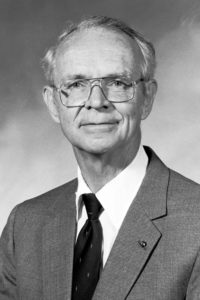
August Lloyd Lovegren, 1921-2022 . IMB Photo
August Lloyd Lovegren, an International Mission Board missionary emeritus who shared the gospel in Jordan, died Nov. 11, 2022. He was one month shy of turning 101.
August was born Dec. 11, 1921, in Ya’an, China, (formerly written Yachow) to the late Levi Alton and Ida Langsea Lovegren. He graduated from Marshall High School in Minneapolis, Minnesota, and received the Bachelor of Science degree from Howard College in Birmingham, Alabama, and the Doctor of Medicine degree from Bowman-Gray School of Medicine in Wake Forest, North Carolina.
His parents were missionaries who served with a Swedish mission agency in China. A love of missions was instilled in August from a young age. Read more of August’s story here.
August served in the U.S. Army during World War II and worked in a tuberculosis sanatorium for seven months before being sent to South Korea to work with the Bureau of Public Health. During his time in South Korea, he spent time with missionaries, and when he was transferred to China, he got to know Southern Baptist missionaries who were serving there. When he finished his medical service, he started attending Southwestern Baptist Theological Seminary in Fort Worth, Texas.
He met his wife, Alta Lee Grimes, at the seminary, and they married in 1951. August worked as a physician at City-County Hospital in Fort Worth.
The Lovegrens answered God’s call to serve Him overseas. The door to serve in China was closed at the time, but the Lord opened a position in the Middle East.
“Not for one moment have we regretted our decision to accept God’s call to serve Him in this area. We are thankful to Him for calling us and permitting us to live for Him in this land of such great physical and spiritual need,” they wrote in a newsletter.
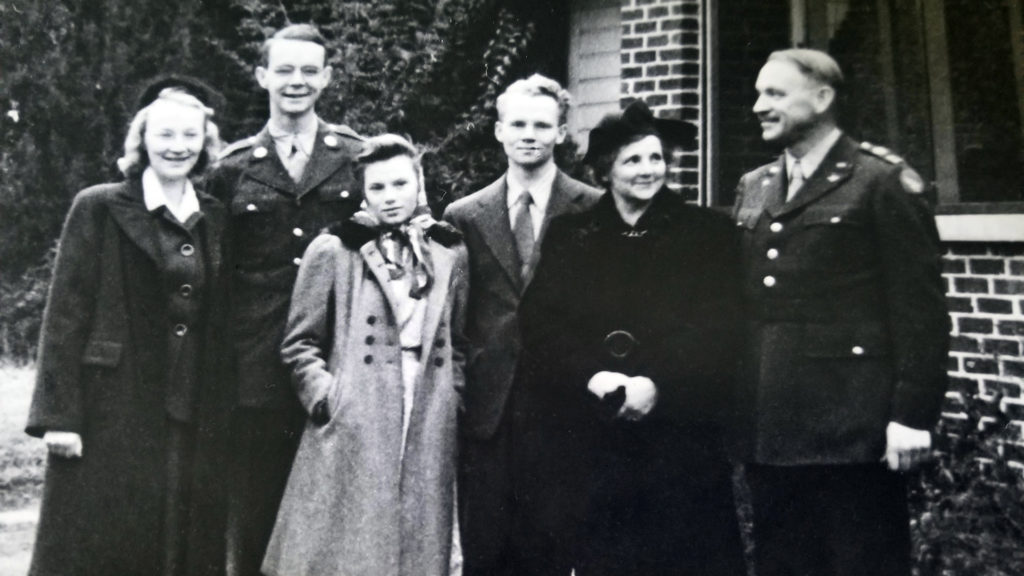
The Lovegren family, Levi, Ida, Millie, August, Norman and Edith, pose for a photo in 1944. Levi and Ida and their children served in China as missionaries. Edith Lambert lives in California and has written two books about her family, one documenting the life of her parents, “Called and Determined: The Story of Lee and Ida Lovegren.” IMB Photo
In 1951, the Foreign Mission Board (now the International Mission Board) appointed August and Alta missionaries to Jordan. August was appointed to serve in Aljoun Baptist Hospital in the city of Aljoun. The hospital ministered to people in 75 villages.
The couple first moved to Beirut, Lebanon, where they studied Arabic for two years. During these years of language school, August’s father was held as a prisoner of war in China.
When they moved to Jordan, they dove into ministering in the hospital and community.
Their obedience to the Lord’s call meant they were, more often than not, in war zones. They served during the Arab Cold War, the Six-Day War, Black September, a civil war, the Yom Kippur War, and multiple assassination attempts of the Jordanian king.
“All of our missionary career, we have been in places of war and rumors of war. God’s people cannot sit down and wait for wars to end. We must advance in wartime as in peacetime,” they wrote.
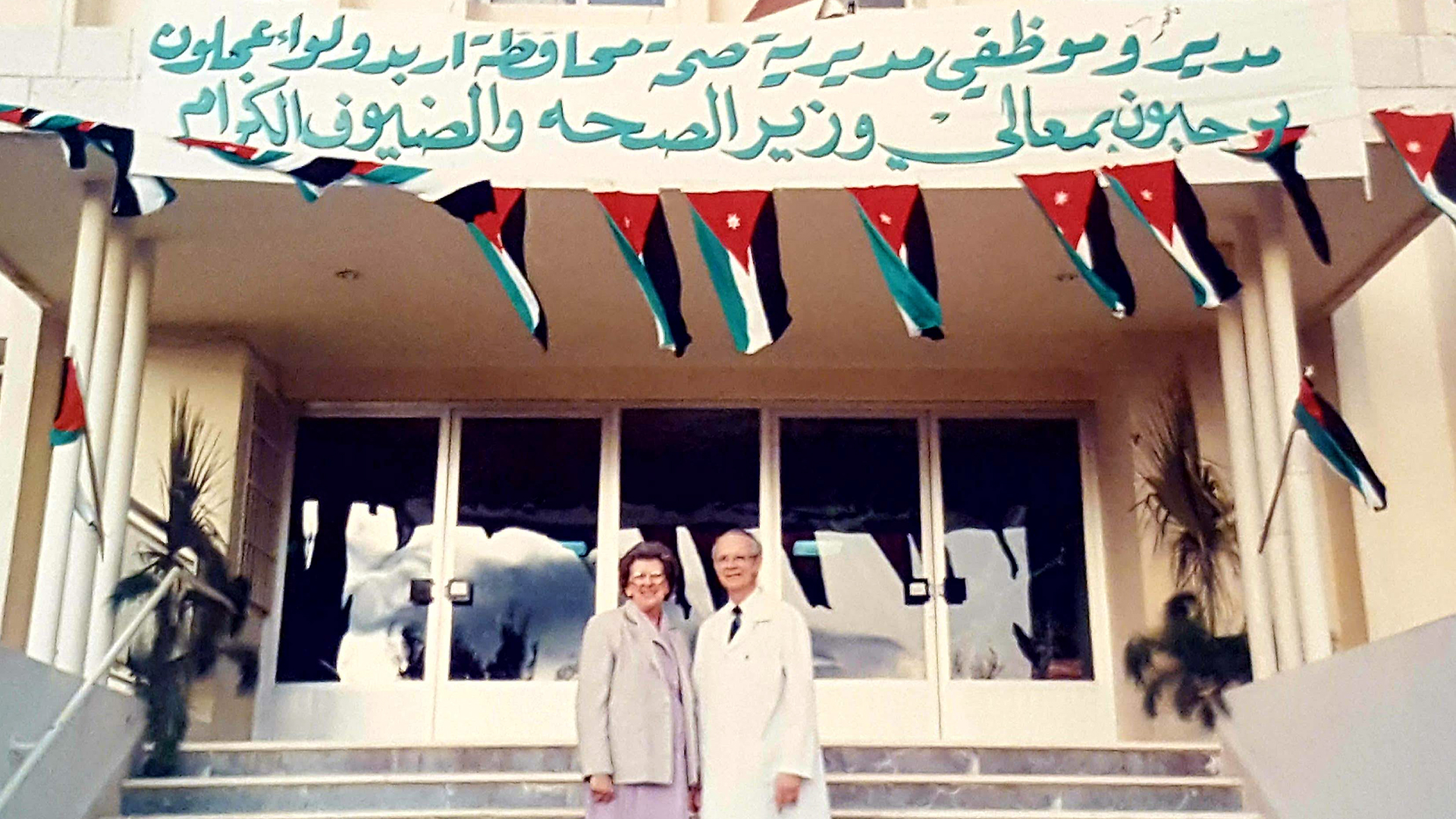
Dr. August and Alta Lee Lovegren stand on the steps of Ajloun Baptist Hospital in Ajloun, Jordan. IMB Photo
In 1955, rioters from eight villages attacked the hospital and school. Thankfully, no one was seriously injured, though significant damages occurred to the facilities. American institutions in the nation and some United Nations institutions were also attacked.
Despite the turmoil, the Lovegrens wrote of the great interest in the gospel, and how people committed their lives to Christ. The gospel was preached in their medical encounters.
When the Lovegrens returned to Jordan after their first home assignment, many Americans were evacuating. They chose to travel back when many were leaving.
August and Alta accepted a short-term assignment to work in the Gaza Baptist Hospital, where they ministered to refugees, hosting Bible studies in their home.
“God gives a person only one life to live and one day at a time to live it, so we have to do the best we can each day, wherever we are,” they wrote in their newsletter.
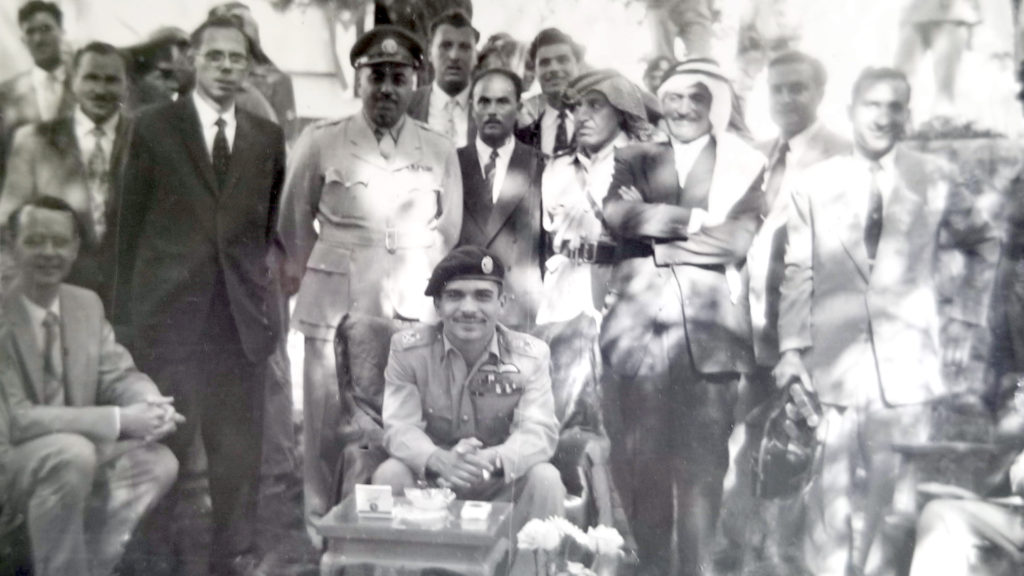
Dr. August Lovegren and staff at the Ajloun Baptist Hospital pose with His Majesty King Hussein bin Talal, the king of Jordan at the time. The hospital received acclaim and recognition for their faithful and dedicated service to Jordanians. IMB Photo
Once they returned to Jordan, and as the war escalated, the Lovegrens waited to hear whether they should leave. When they made plans to leave, they learned the airport was bombed, and they could not fly. A radar station near their house was attacked, and their girls hid under tables as the house shook during the attack.
During the raids, August and Alta decided he should stay in the hospital in case he was needed to attend to medical needs.
During the Six-Day War of 1967, rumors spread that the missionaries were partnering with enemies. Local officials recommended that everyone, except August, evacuate. Alta and their children were evacuated to Iran, while August remained to meet medical needs.
In the aftermath of the war, refugees from Israel poured into Jordan, and the more serious cases were sent to the Baptist hospital.
“In the face of all this change, unrest, frustration and suffering, the work of the churches has gone on in a fine way. Some are being saved and others are growing in their Christian walks,” they wrote.
The Lovegrens heard there was a great need for another doctor in Yemen, so they packed up to work in the Baptist hospital in Jibla for fourth months.
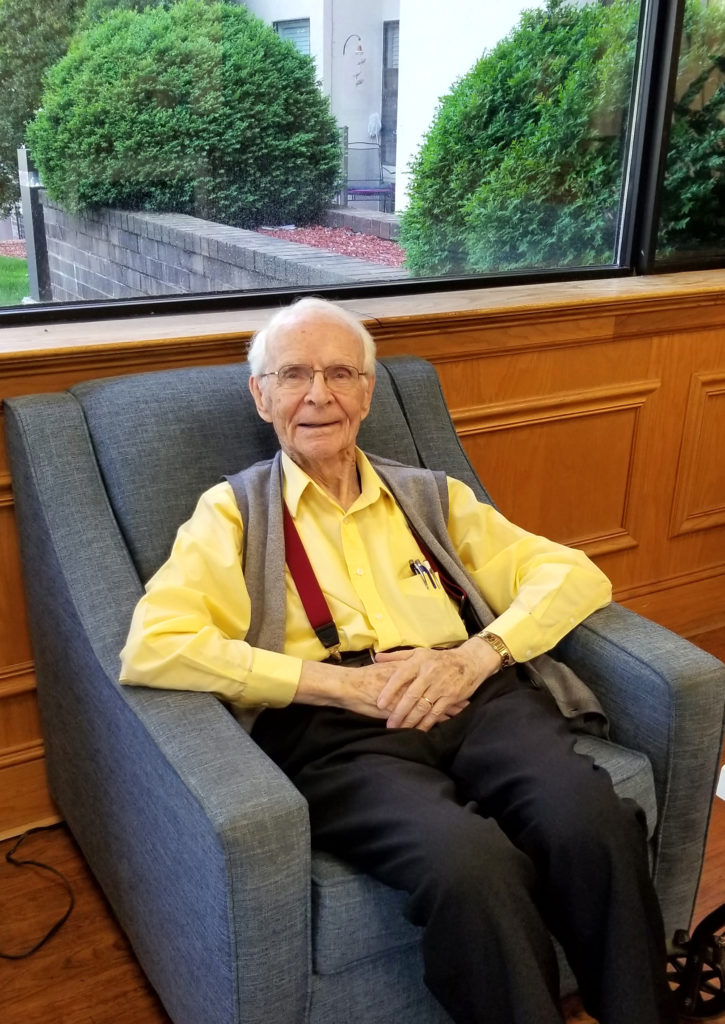
Dr. August Lovegren poses for a photo on Easter Sunday. In his retirement, Lovegren continued to serve. IMB Photo
In 1987, when the hospital closed, the Lovegrens grieved, but they celebrated all the Lord did through the hospital.
“When this hospital was established, there were no evangelical churches in the area, very few born-again Christians, and very few people who owned a Bible. Now, there are Baptist churches in this area and preaching points. The number of believers has increased. There is a Bible in nearly every home and much more enlightenment concerning the truth of Scriptures,” they wrote in their newsletter.
There used to be no other hospital in the area and few medical services. New hospitals and clinics were opened in surrounding areas. Midwives and doctors came to the area.
A delegate of Jordanian king Hussein bin Talal presented August with the Order of Independence Medal.
The Lovegrens retired after 35 years of service.
In his retirement, August continued to use medicine to serve. He took several short-term medical mission trips to Yemen, Jordan and northern Iraq. During the Gulf War, a time when few Americans dared travel to the region, August traveled to Yemen to serve in Jibla Baptist Hospital.
His life and ministry were an inspiration to many.
Andy Pettigrew, the manager of NextGen mobilization, recalls meeting August at an emeritus event.
“After spending the past 13 years raising my family on mission in Sub-Saharan Africa and devoting my life to investing in the next generation of missionaries, I was honored to meet one who had gone before me modeling what each generation must embrace,” Pettigrew said.
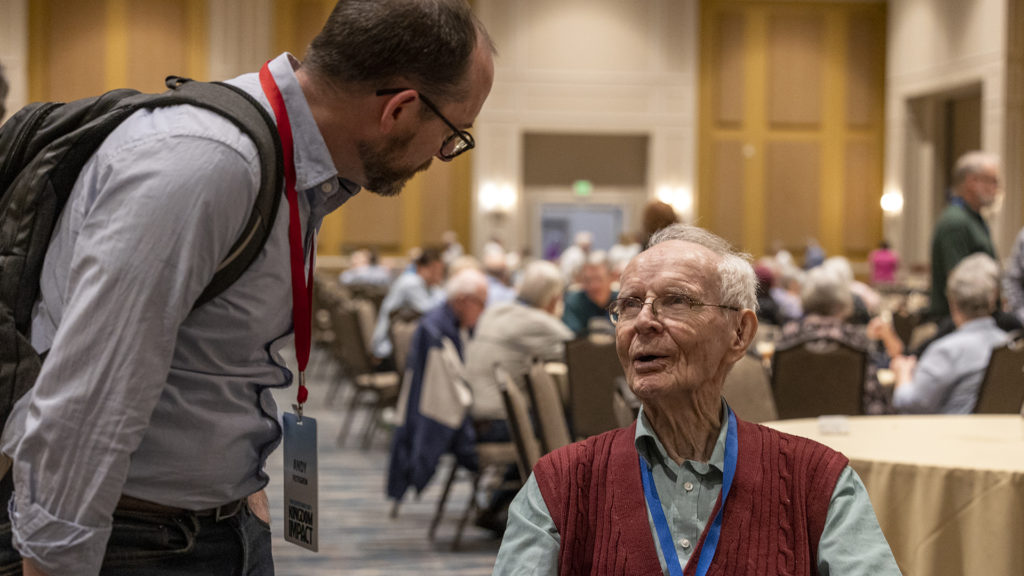
Current IMB staffer and former missionary Andy Pettigrew speaks with August Lovegren who spent 35 years serving in the Middle East. Lovegren, age 100 and the oldest emeritus at the Celebration of Emeriti event in Orlando in 2021, is also a missionary kid from East Asia. IMB Photo
Hearing August share his desire to serve in another country so soon after World War II was surprising to Pettigrew.
August explained, “The war was bad but the spiritual situation around the world was worse. God told me to go tell others about Jesus in a place where Jesus was not known, and I could think of nothing better than to be obedient and carry out His mission.”
Pettigrew told August what his role was at the IMB and asked if he had any advice.
“He said that there was ‘nothing more important than following Jesus and being faithful to Him. You only have one life to life. Live it for what matters,’” Pettigrew said.
August is preceded in death by his wife of 62 years, Alta Lee Lovegren.
He is survived by his daughters, Miriam Lanier (Homer), and Linda Rowland (David); seven grandchildren; and two great-grandchildren.
A memorial service was held Nov. 17, in Hickory Chapel at Woodbine Funeral Home in Nashville, Tennessee. His burial was held Nov. 19 in Cedartown, Georgia. Visitation was held at Gammage Funeral Home in Cedartown.
Donations in his memory may be made to the Lottie Moon Offering, IMB, 3806 Monument Avenue, Richmond, VA 23230, or online at Generosity Resource Center – IMB Generosity.
Read an obituary here.

